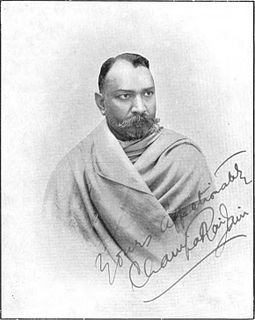Religion is a social-cultural system of designated behaviors and practices, morals, worldviews, texts, sanctified places, prophecies, ethics, or organizations, that relates humanity to supernatural, transcendental, or spiritual elements. However, there is no scholarly consensus over what precisely constitutes a religion.

Comparative religion is the branch of the study of religions concerned with the systematic comparison of the doctrines and practices, themes, and impacts of the world's religions. In general the comparative study of religion yields a deeper understanding of the fundamental philosophical concerns of religion such as ethics, metaphysics, and the nature and forms of salvation. Studying such material facilitates a broadened and more sophisticated understanding of human beliefs and practices regarding the sacred, numinous, spiritual, and divine.

Religious studies, also known as the study of religion, is an academic field devoted to research into religious beliefs, behaviors, and institutions. It describes, compares, interprets, and explains religion, emphasizing systematic, historically based, and cross-cultural perspectives.

The Bene Israel are a community of Jews in India. It has been suggested that it is made up of descendants of one of the disputed Lost Tribes and ancestors who had settled there centuries ago. In the 19th century, after the people were taught about normative (Ashkenazi/Sephardi) Judaism, they tended to migrate from villages in the Konkan area to the nearby cities, primarily Mumbai, but also to Pune, Ahmedabad, India; and Karachi, in today's Pakistan. Many gained positions with the British colonial authority of the period.

Harvard Divinity School (HDS) is one of the constituent schools of Harvard University in Cambridge, Massachusetts. The school's mission is to educate its students either in the academic study of religion or for leadership roles in religion, government, and service. It also caters to students from other Harvard schools that are interested in the former field. HDS is among a small group of university-based, non-denominational divinity schools in the United States.
Morals and Dogma of the Ancient and Accepted Scottish Rite of Freemasonry, or simply Morals and Dogma, is a book of esoteric philosophy published by the Supreme Council, Thirty Third Degree, of the Scottish Rite, Southern Jurisdiction of the United States. It was compiled by Albert Pike, was first published in 1871 and was regularly reprinted thereafter until 1969. An upgraded official reprint was released in 2011, with the benefit of annotations by Arturo de Hoyos, the Scottish Rite's Grand Archivist and Grand Historian.
Hinduism and Sikhism are Indian religions. Hinduism has pre-historic origins, while Sikhism was founded in the 15th century by Guru Nanak. Both religions share many philosophical concepts such as Karma, Dharma, Mukti, Maya although even these concepts differ eg: Karma in Hinduism is what the body does but in Sikhism it is what the mind thinks. In the days of the Mughal Empire, the Sikh community came to the defence of the persecuted who were being forcibly converted to Islam.
Françoise Meltzer is a professor of Philosophy of Religion at the University of Chicago Divinity School. She is also the Edward Carson Waller Distinguished Service Professor of the Humanities and Chair of Comparative Literature at the University of Chicago.

Andrew Wilson, full name Andrew Murray Wilson, is the Director of Scriptural Research and Professor of Scriptural Studies of the Unification Theological Seminary (UTS), the main seminary of the international Unification Church.

Terryl Lynn Givens is a professor of literature and religion at the University of Richmond, where he holds the James A. Bostwick Chair in English. He is a visiting fellow at the Neal A. Maxwell Institute of Religious Scholarship at Brigham Young University (BYU).

History of Religions (HR) is the first academic journal devoted to the study of comparative religious history. The journal was founded in 1961 by Mircea Eliade. It is currently published by the University of Chicago Press. HR publishes articles that set the standard for the study of religious phenomena from prehistory to modern times, both within particular traditions and across cultural boundaries. In addition to major articles, the journal also publishes review articles and comprehensive book reviews. The journal also occasionally publishes special or theme issues. It is intended for historians of religion, anthropologists, comparative historians, and interdisciplinary scholars of religion.
In religious studies and folkloristics, folk religion, popular religion, or vernacular religion comprises various forms and expressions of religion that are distinct from the official doctrines and practices of organized religion. The precise definition of folk religion varies among scholars. Sometimes also termed popular belief, it consists of ethnic or regional religious customs under the umbrella of a religion, but outside official doctrine and practices.

A Community of Witches: Contemporary Neo-Paganism and Witchcraft in the United States is a sociological study of the Wiccan and wider Pagan community in the Northeastern United States. It was written by American sociologist Helen A. Berger of the West Chester University of Pennsylvania and first published in 1999 by the University of South Carolina Press. It was released as a part of a series of academic books entitled Studies in Comparative Religion, edited by Frederick M. Denny, a religious studies scholar at the University of Chicago.

Modern Paganism in World Cultures: Comparative Perspectives is an academic anthology edited by the American religious studies scholar Michael F. Strmiska which was published by ABC-CLIO in 2005. Containing eight separate papers produced by various scholars working in the field of Pagan studies, the book examines different forms of contemporary Paganism as practiced in Europe and North America. Modern Paganism in World Cultures was published as a part of ABC-CLIO's series of books entitled 'Religion in Contemporary Cultures', in which other volumes were dedicated to religious movements like Buddhism and Islam.
The Baháʼí Faith in Africa has a diverse history. It is the third most widespread organized Abrahamic religion in Africa after Christianity and Islam. The Association of Religion Data Archives lists many large and smaller populations in Africa with Kenya, the Democratic Republic of the Congo, South Africa and Zambia among the top ten numerical populations of Baháʼís in the world in 2005, and Mauritius in terms of percentage of the national population.
"Comparative Religion" is the twelfth episode of the first season of the American comedy television series Community. It aired in the United States on NBC on December 10, 2009.
Hinduism and Judaism are among the oldest existing religions in the world. The two share some similarities and interactions throughout both the ancient and modern worlds.

Champat Rai Jain (1867–1942) was a Digambara Jain born in Delhi and who studied and practiced law in England. He became an influential Jainism scholar and comparative religion writer between 1910s and 1930s who translated and interpreted Digambara texts. In early 1920s, he became religiously active in India and published essays and articles defending Jainism against misrepresentations by colonial era Christian missionaries, contrasting Jainism and Christianity. He founded Akhil Bharatvarsiya Digambara Jain Parisad in 1923 with the aim of activist reforms and uniting the south Indian and north Indian Digambara community. He visited various European countries to give lectures on Jainism. He was conferred with the title Vidya-Varidhi by Bharata Dharma Mahamandal.
Chakravarthi Ram-Prasad, FBA is the Distinguished Professor of Comparative Religion and Philosophy at Lancaster University. His research focuses on Indian religions – Hinduism, Buddhism and Jainism – and comparative phenomenology, epistemology, metaphysics and philosophy of religion. His studies include the conceptual roots of contemporary beliefs, politics and conflict in religious context, and the religious identities of South Asian diaspora in the United Kingdom. He was elected as a Fellow of the British Academy in 2017.









